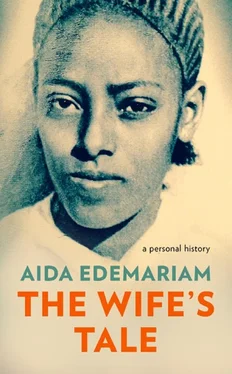Her husband would be up by then too, sometimes taking breakfast, more often not, pulling on jodhpurs, a long shirt with tight embroidered wrists, full black cape, turban. Other priests took their time, winding the lengths of white cotton just so, but he was impatient with it, and she, who was so particular and neat about her person, would glance at the mess on his head in silent irritation.
If she ate breakfast she ate it alone. Light began to fill the big house, and the sound of chopping; the smell of onions frying, and Alemitu running, or crying. Sometimes there would be the guttural bleat of a sheep, suddenly cut off, or the flapping screech of a chicken losing its head, but more often it was pulses and spices and vegetables that required cleaning, pounding, mixing, bubbling for hours over the fire. A pause at nine, for fresh-roasted coffee with the servants, a basket of delicate sorghum popcorn, a knobble of incense dropped onto red coals, and then it was back to the dark kitchen hut, to lean over the flat clay pan, pouring thin sourdough in quick, even spirals so it made the thinnest, whitest possible injera.
Just before he came home at one she would take the ilbet from the side, where it had cooled, and beat it into a savoury paste. She would heat the sauces she had made that morning, roll fresh injera – always far more than she needed for the two of them, because she never knew who he was going to bring home. She never sat with them, of course, but as she came back and forth from the kitchen, serving them, she caught snatches of talk. Church politics, the whereabouts and doings of the new emperor. Those Italians at the new consulate up the road: employees were given better housing and their own school, and many townsfolk were envious. Now someone had attacked the foreigners’ telegraph station, because, they said, it was the work of the devil.
Occasionally she raised her eyes from the ground or the dish she was serving to glance at her husband. She saw that he was a listener, and a watcher, a man who knew the power of silence and of a quiet, steady voice. She saw his thoughtful courtesy, in these days when he was working assiduously to consolidate his position; saw his veiled pride; knew, even if he did not show it, his foreigner’s anxiety, the insecurity of recent arrival (though he had now been in Gondar for over two decades), his need to prove himself better, worthier, accepted.
He was not always home. He had obligations at Gonderoch Mariam, where he led the church as well as owning land; in the capital, where it was useful to keep his face fresh in the right minds; for one too-short month in Gojjam, where, much later, when she actually cared enough to notice and ask about such things, she learned he had pitched a tent outside his childhood church to teach poetry and church administration.
Her own limits were established now – these cool rooms, the expanse of fenced ground around them, the narrow gateway through which she could see snatches of activity in the market – and she no longer dared to venture beyond them. She did not invite anyone round – and anyway, who would she ask? He could not forget how her father had so looked down on him, and now they had their own house he had made it clear her family were not welcome. Neither were girls her own age, being potential agents of temptation.
But local matrons sometimes bowed through the doorway, nuns, a kind hunchbacked priest, and she sat before them, heels tucked under her, pouring coffee, occasionally suckling the child, silent but for murmured rote responses, while in her mind questions nudged toward clarity. There was tradition, she knew that – how many times had she heard a chuckling elder say it, that women and donkeys need the stick? Then there was the fact that, as her husband had pointed out more than once, you were an unformed child entrusted to my care, and all children must take correction. There was their specific circumstance, which over and over he explained. You cannot be gadding about and blackening my name. A priest must be blameless, and so must his family, they cannot be accused of luxury or lechery or stubbornness, they must be seen to be obedient. You cannot damage my position. And: our vow was for life, made in the church; you risk your soul. And: aqwatiré yizishalehu. I will care for you, look out for you; I will gather you up and hold you close.
One afternoon when she was about nineteen, two young men, strangers, came to see her husband on business. She was in the back yard when they left and one of them darted over to grab her hands in his. ‘Come, come with us.’ Startled, giggling, she snatched them away. Where? Why? Unable to explain to someone so uncomprehending, he dropped her hands and took hurried leave. Did you see, master? she said later. How good-looking they were? She meant it innocently, would have said the same, she told herself, if they were women and beautiful; she was admiring God’s work, what else could she possibly mean?
Why did you not go with them, then? He smiled, but at once she saw herself through his narrowed eyes, and through theirs. Long lashes, decent teeth, a slender, mobile, fertile body. A high forehead and long nose. Skin alight with youth.
The next time he punished her she ran away. Ran panting to her grandmother’s house, was received with hugs, with good food, with comfort – Ayzosh, enaté, ayzosh, my heart. Ayzosh. And was, a few days later, returned to her husband. You are friends again now, aren’t you? Good.
Again she slept a great deal. She prayed. And she dreamed.
One night she dreamed that the bishop Abunè Abraham came to her, slipping into the bedroom at the top of the house. She watched him, unable to stir or speak. A shiny black hat, a nice face, she thought, at least from what she could see between hat and beard, but she was afraid to look too close. There was a huge metal-bound chest in the room, a present from her grandmother, who had bought it from traders from Tripoli. The bishop reached for the heavy clasp at the centre. He fed a key into the lock and turned it. Slowly he raised the lid. Then he bent down and lifted out an umbrella of rare beauty. It was topped by a cross, as on the roof of a church, and so laden with gold and silver that when he opened it out – kwa! – it trembled and rang. ‘Take this,’ he said, turning the handle toward her. ‘It’s yours.’ And then he was gone.
When she woke she asked her husband what the dream could mean.
You will give birth to a son, he replied. And he will be a shade and a protection in the world.
‘AND BEHOLD THERE WAS A CERTAIN WOMAN TRAVELLING WITH THE COMPANY WHO WAS WITH CHILD, AND HER TIME FOR BRINGING FORTH WAS NIGH, AND SHE WAS UNABLE TO RUN AWAY WITH THE OTHER PEOPLE. AND SHE CRIED OUT AFTER THOSE WHO HAD FORSAKEN HER AND FLED, BUT NO MAN TURNED BACK TO HAVE REGARD UNTO HER, AND SHE FOUND NONE TO HELP HER, AND DESPAIRED UTTERLY OF OBTAINING HELP FROM MAN.’
She had been labouring for two days already, and the priests had been reading in turn, from the Dirsanè Ruphael, and now from the Miracles of Mary.
‘AND IT CAME TO PASS THAT, WHEN THOSE WHO HAD TAKEN FLIGHT ARRIVED AT THE SEASHORE, SHE STRETCHED OUT HER HANDS, AND RAISED HER EYES TO GOD IN HEAVEN, AND MADE SUPPLICATION TO OUR LADY MARY WITH GREAT OUTCRY AND WITH MUCH WEEPING AND LAMENTATION.’
Her husband, appalled by her labour, had remained in the room – the receiving room, this time; so many people were attending this birth there was no space for them in the main house. He bowed to the ground in prayer and wept so much he asked for a cup to be brought, a dark cup, hollowed out of cow horn. His tears dripped into the rough bottom and when he had collected a finger’s height he handed it to one of the women. Give her this to drink. Maybe it will hasten the birth.
Mariam Mariam Mariam Mariam Mariam, dirèshilin.
Читать дальше












